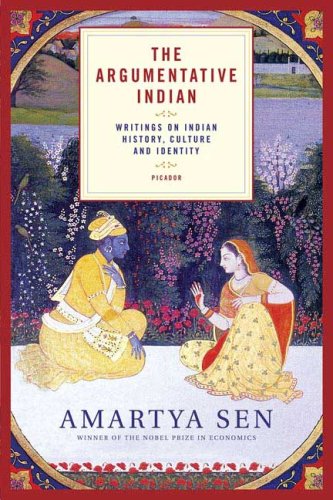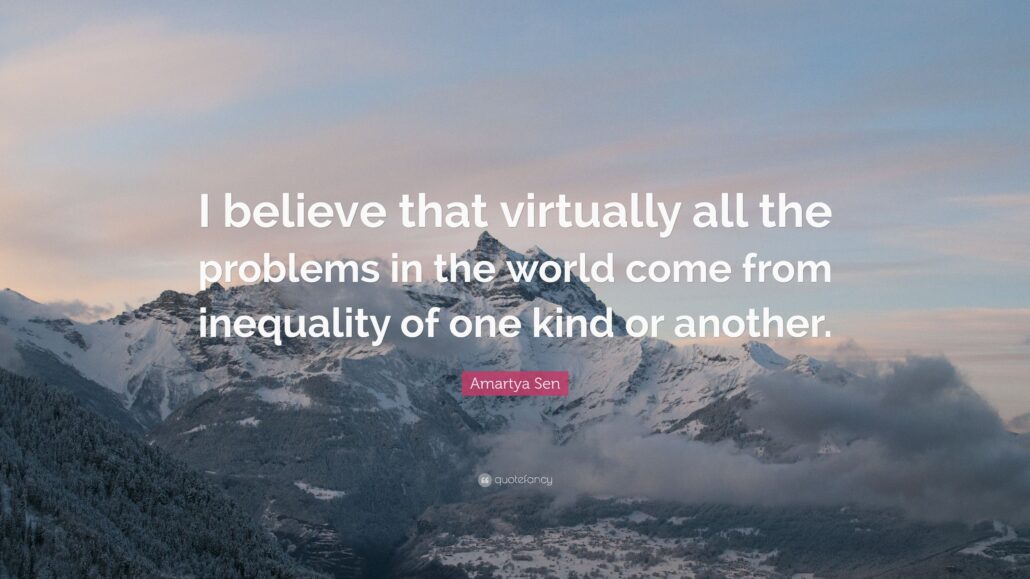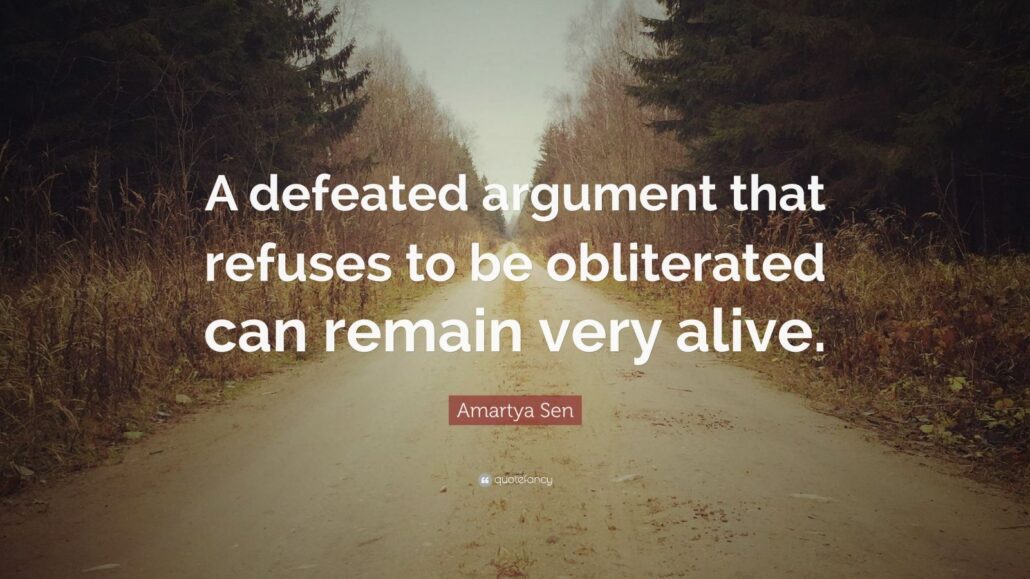The Argumentative Indian: Writings on Indian History, Culture and Identity
Author: Amartya Sen
Genre: History

Who doesn’t know Amartya Sen. Awarded the Nobel Prize in Economics for his contribution to welfare economics, he teaches at Harvard and was formerly the Master of Trinity College at Cambridge. He has been visiting faculty at MIT, UCB, LSE and Cornell, apart from top Indian economics institutions like DSE, JNU, ISI etc. He was also awarded India’s highest honour, Bharat Ratna. Time magazine included him in its “100 most influential persons in the world” list.
A prolific writer, Sen wrote almost 30 books including The Idea of Justice, Rationality and Freedom, Identity and Violence, Poverty and Famine etc. The Argumentative Indian looks at the spiritual and intellectual heritage of India and argues that there has been a long tradition of questioning the truth of ideas through discussion and dialogue and that this discussion played a crucial role in the success of democracy and secularism. The sub-title of the book is ‘Writings on Indian Culture, History and Identity’ and has 4 major parts: Voice and Heterodoxy, Culture and Communications, Politics and Protest, and lastly Reason and Identity. All four sections have essays related to these issues, and in all there are 16 essays.

The first section explains the great culture of pluralistic debate within India from historic times. The chapter funnily starts with saying, “Prolixity is not alien to us in India… We do like to speak” and gives the example of an Indian (Krishna Menon) who gave the longest recorded speech in the United Nations (nine hours non-stop!). The Indian epic Mahabharata alone is about seven times as long as the Iliad and the Odyssey put together. But beyond just length, most Indian epics “are engagingly full of dialogues, dilemmas and alternative perspectives. And we encounter masses of arguments and counter arguments…” For example, the Indian philosophical text, Gita, centres around whether to focus on doing one’s duty (Krishna’s argument) or look at the end results (Arjun’s dilemma). And while Krishna’s argument wins, “the epic presents, sequentially, each of the two contrary arguments with much care and sympathy”. [Interestingly, the father of the atomic bomb, Robert Oppenheimer, quoted Gita when describing the destruction through the bomb: ‘I am become death, the destroyer of worlds’].

So, the idea in India has always been to encourage debate. Even in Ramayana, another great Indian epic, there is space given to Javali who says, “there is no after-world… the injunctions about the worship of gods, sacrifice, gifts, and penance have been laid down in the scriptures by clever people, just to rule over other people.” So even within a semi-religious text, there is space given for atheistic and agnostic thoughts. The point Sen makes is that India – historically – had a rich culture of dissent and allowing all viewpoints to be heard.

This rich tradition also encompassed women (a woman scholar, Gargi, provides the sharpest edge to the intellectual interrogation in Brihadaranyaka Upanishad). Similarly, while one of the evils of ancient India was the caste system, there were plenty of voices that spoke against caste (the Bhavisya Purana says, ‘Since members of all the four castes are children of God, they all belong to the same caste. All human beings have the same father, and children of the same father cannot have different castes.’). Sen keeps giving example after example that to claim one version of truth or one version of history would be supremely erroneous in such a multi-cultural identity as India.
Amartya Sen further illustrates the argumentative tradition in the modern day using Gandhi and Tagore, who had a relationship of great respect for each other while having completely contradicting viewpoints towards nationalism, education, and economy.

And therefore, in the next essay, Inequality, Instability and Voice, Sen explains that “Democracy is intimately connected with public discussion and interactive reasoning. When independent India became the first country in the non-Western world to choose a resolutely democratic constitution, it not only used what it had learned from the institutional experiences in Europe and America, it also drew on its own tradition of public reasoning and argumentative heterodoxy.”

A true Bengali at heart, Sen has dedicated an essay each to two of West Bengal’s most well-known creative people: Rabindranath Tagore (first non-European to win Nobel prize in Literature and perhaps the only author of two national anthems: India’s and Bangladesh’s) and Satyajit Ray (film-maker, only Indian to have won an Honorary Academy Award or Oscars).

The third section of the book talks about the conflict of class, criticizes inequalities & arguments that are used to justify them. In the last section the book explores modern cultures of secularism and liberalism in Indian context.
I enjoyed the quote from Raja Ram Mohan Roy (1800s), father of the Indian renaissance and reformer-par-excellence: “Just consider how terrible the day of your death will be. Others will go on speaking, and you will not be able to argue back.”
Sen has been able to balance his views both as an insider (India origin) and an outsider (lived more than 50 years in UK and US) beautifully throughout the book across all the subjects. Though it is not an easy book to read and requires a considerable amount of commitment from the reader, it is worth every single hour spent.
As individual essays written at different times, sometimes we may find paragraphs repetitive. For example, Sen has mentioned about Akbar and Ashoka’s multiculturalism multiple times [Sen’s own starting statement ‘prolixity is not alien to us’ comes back to haunt him!]. Perhaps a better editing could have been done. Also, the essays in the second part (India and the nuclear bomb) are completely disjointed from the original theme of argumentation and debate.
Why Should You Read the Book: The book showcases Nobel laureate Sen’s vast and multi-faceted knowledge, and his deep commitment to a liberal, diverse democratic setup. After reading this book, one wants to read and learn more about Rabindranath Tagore, Jalaluddin Akbar, Ashoka and ancient Indian literature on atheism and agnosticism.
Goodreads Link: The Argumentative Indian: Writings on Indian History, Culture and Identity by Amartya Sen (goodreads.com)

 This information will never be shared with third party
This information will never be shared with third party
Post A Comment
Want to join the discussion?Feel free to contribute!